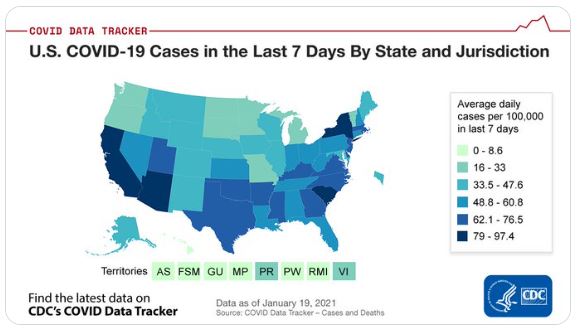
As of today, the debate over vaccine mandates has been a trending topic in the United States. With the ongoing COVID-19 pandemic and the emergence of new variants, the discussion around vaccine mandates has become a contentious issue that has sparked debates across the nation. In this article, we will take a closer look at the topic of vaccine mandates, explore the arguments for and against them, and discuss why it has become a hot topic in the USA.
current status of covid in usa
In United States of America, from 3 January 2020 to 4:16pm CEST, 3 May 2023, there have been 103,266,404 confirmed cases of COVID-19 with 1,124,063 deaths, reported to WHO. As of 6 April 2023, a total of 666,541,020 vaccine doses have been administered.
What are Vaccine Mandates?

Vaccine mandates refer to the requirement for individuals to receive a vaccine or a series of vaccines as a condition of employment, education, or participation in certain activities. These mandates are intended to protect individuals and communities from infectious diseases by ensuring that a certain percentage of the population is vaccinated.
What is fully vaccinated USA?
If you have received both doses of an accepted 2-dose vaccine series, regardless of how long it has been between doses, you are considered fully vaccinated. as per cdc.gov
Current status of vaccination in USA
Percent of people receiving vaccines in the US
At least 270,047,396 people or 81% of the population have received at least one dose.
Overall, 230,533,196 people or 69% of the population are considered fully vaccinated.
Arguments For Vaccine Mandates
Advocates for vaccine mandates argue that they are necessary to protect public health, particularly during a pandemic. They believe that vaccine mandates can help prevent the spread of infectious diseases, reduce hospitalizations, and save lives. Proponents also argue that vaccine mandates are supported by scientific evidence and are a necessary measure to protect vulnerable populations, such as children, the elderly, and individuals with weakened immune systems.
Arguments Against Vaccine Mandates
Opponents of vaccine mandates argue that they violate individual freedom and autonomy, and that people should have the right to choose whether or not to receive a vaccine. They also question the safety and efficacy of vaccines, citing concerns about potential side effects and long-term health risks. Additionally, opponents argue that vaccine mandates may lead to discrimination against individuals who choose not to receive a vaccine, and that there are other effective measures, such as social distancing and mask-wearing, that can help prevent the spread of infectious diseases.
Why is the Debate Over Vaccine Mandates Trending in the USA?
The debate over vaccine mandates has become a hot topic in the USA due to the ongoing COVID-19 pandemic and the emergence of new variants. The Centers for Disease Control and Prevention (CDC) has recommended vaccination as a critical measure to prevent the spread of COVID-19 and protect public health. However, some states have resisted vaccine mandates, and there have been legal challenges to vaccine mandates in schools and workplaces.
what are the benefits of Getting vaccinated
Getting vaccinated could save your life
COVID-19 vaccines provide strong protection against serious illness, hospitalization and death
There is also some evidence that being vaccinated will make it less likely that you will pass the virus on to others, which means your decision to get the vaccine also protects those around you.
Who Should not be Vaccinated against COVID-19 as per WHO
You have a history of severe allergic reactions/anaphylaxis
You have a fever over 38.5ºC on the day of your vaccine appointment. Postpone until you have recovered.
You currently have confirmed or suspected COVID-19. Wait until you have completed the mandated isolation period and your acute symptoms have passed to get vaccinated.
Best COVID-19 vaccine
below vaccines are suggested by WHO, so you can take any of below as per availability.
types of vaccine available for covid-19 (as per WHO)
As of 12 January 2022, the following vaccines have obtained EUL:
- The Pfizer/BioNTech Comirnaty vaccine, 31 December 2020.
- The SII/COVISHIELD and AstraZeneca/AZD1222 vaccines, 16 February 2021.
- The Janssen/Ad26.COV 2.S vaccine developed by Johnson & Johnson, 12 March 2021.
- The Moderna COVID-19 vaccine (mRNA 1273), 30 April 2021.
- The Sinopharm COVID-19 vaccine, 7 May 2021.
- The Sinovac-CoronaVac vaccine, 1 June 2021.
- The Bharat Biotech BBV152 COVAXIN vaccine, 3 November 2021.
- The Covovax (NVX-CoV2373) vaccine, 17 December 2021.
- The Nuvaxovid (NVX-CoV2373) vaccine, 20 December 2021
Conclusion
As of May 5, 2023, the debate over vaccine mandates has become a trending topic in the USA. The discussion around vaccine mandates is driven by concerns over public health and individual rights, and is likely to continue as the COVID-19 pandemic evolves. By understanding the arguments for and against vaccine mandates, we can gain a better understanding of the current debates and the potential impact of vaccine mandates on public health and individual freedoms.

